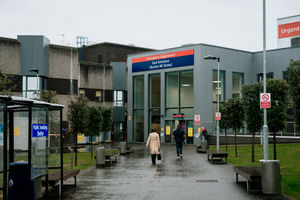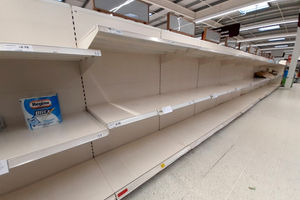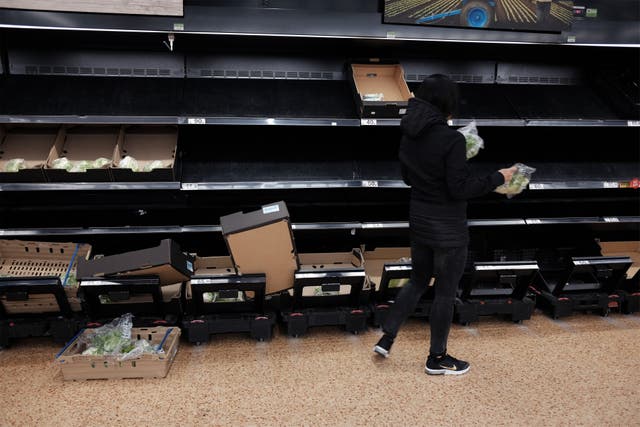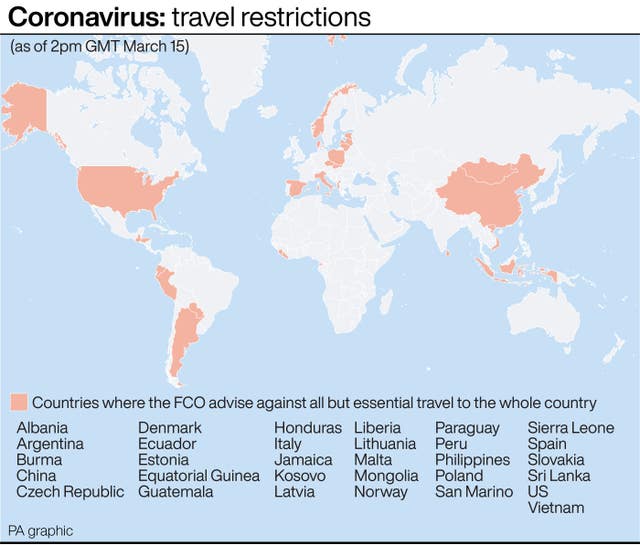Wolverhampton and Dudley patients die as UK coronavirus death toll reaches 35
More coronavirus patients have died in Wolverhampton and Dudley as the UK’s death toll reached 35.

The Department of Health said 14 more patients have died in England after testing positive for Covid-19. This follows the 10 deaths announced on Saturday.
A total of 34 people have died from the virus in England, while there has been one death in Scotland.
Among the deaths confirmed on Sunday was a woman from Wolverhampton, who was aged in her 60s and had underlying health conditions, and a patient in their 80s from Dudley.
It means a total of six patients have died in the Black Country and Birmingham: Three in Wolverhampton, two in Dudley and one in Birmingham.
David Loughton, chief executive of the Royal Wolverhampton NHS Trust, said: "Sadly we can confirm that a woman who was being cared for at New Cross Hospital, and had tested positive for Covid-19, has died.
"The patient, who died on March 14, was in her 60s and had underlying health conditions.
"Her family has been informed and our thoughts and condolences are with them at this difficult and distressing time.
"The media are asked to respect the wishes of the families and the interests of staff at the hospital to avoid any disruption to operational services."

It is not yet known if the patient in Dudley was a man or a woman.
Diane Wake, chief executive of the Dudley Group NHS Foundation Trust, said: "The trust can confirm that a patient in their 80s being treated for underlying health conditions has died. The patient had tested positive for Covid-19.
"The family has been informed and our condolences and our thoughts are with them at this difficult time.
"We will not be commenting further and ask that everybody respects the family's privacy."
More coronavirus news:
There have been a total of 1,372 positive tests for coronavirus in the UK as of 9am on Sunday, up from 1,140 at the same time on Saturday, the DoH said.
The full number of cases will be higher as people with mild symptoms are no longer being tested.

It is not yet known how many of the new positive tests were in the Black Country or Staffordshire, although four new cases have been confirmed in Worcestershire taking the total in the county to six.
Two men in their 80s who were being treated at New Cross Hospital in Wolverhampton and City Hospital in Birmingham were among the deaths confirmed on Saturday.
New measures
Health Secretary Matt Hancock said people aged over 70 will be asked in the coming weeks to self-isolate for up to four months, in order to protect them from the virus.
Asked if that time frame was in the Government’s plan, he told Sky’s Sophy Ridge On Sunday: “That is in the action plan, yes, and we will be setting it out with more detail when it is the right time to do so, because we absolutely appreciate that it is a very big ask of the elderly and the vulnerable, and it’s for their own self-protection.”
Pressed on when the measure will be introduced, he said: “Certainly in the coming weeks, absolutely.”
Mr Hancock added: “The measures that we’re taking, the measures that we’re looking at taking, are very, very significant and they will disrupt the ordinary lives of almost everybody in the country in order to tackle this virus.”
He also confirmed that ministers were seeking to give police powers to arrest and forcibly quarantine people who are sick with the virus but are not self-isolating.
“We are going to take the powers to make sure that we can quarantine people if they are a risk to public health, yes, and that’s important,” he told The Andrew Marr Show on the BBC.
“I doubt that actually we will need to use it much, because people have been very responsible.”
Meanwhile coronavirus cases have been confirmed at Halesowen College and Hateley Heath Primary School in West Bromwich.
The school is closing on Monday after its business manager was diagnosed, while the college is staying open but students are being allowed to study from home after a positive case in its nursery.
It comes after hospitals across the region restricted access to visitors, with New Cross in Wolverhampton and Sandwell General among those to ban all visits apart from limited amounts to the maternity, paediatric and neonatal departments.
And as major events continue to be postponed or cancelled, Wolves has fully shut down Molineux with no tours, museum visits or conferences taking place for at least three weeks.
Ventilators needed
Prime Minister Boris Johnson will personally urge manufacturers to shift their production lines to build ventilators, amid concerns that critical care facilities will come under intense pressure as the Covid-19 crisis intensifies.

Mr Hancock said: “The thing the NHS needs now more than anything else is more ventilators. We’ve been buying as many as we can but we need to produce more too.”
He said he could not make guarantees that everyone who requires a ventilator will get one, saying: “We don’t make guarantees in healthcare.”
Engineers have already been asked to draw up plans to quickly produce more ventilators in the UK, with JCB confirming it had been approached by the Prime Minister regarding the production of such equipment.
The Health Secretary said a Bill setting out emergency powers to deal with the outbreak will be published on Thursday, and details of what the powers will include will be shared on Tuesday.
Mr Hancock said ministers are yet to make a decision on whether to ban gatherings of more than 500 people in the rest of the UK, after Scotland said it would bring in restrictions from Monday.

The Government is in talks with private hospitals about the possibility of taking over beds, in a further sign of the pressures that will face the health service at the peak of the coronavirus outbreak.
There could also be a shift to household isolation rather than individual self-isolation.
Experts on the UK’s Scientific Advisory Group for Emergencies (Sage) set out the need for extra action to slow the spread of the disease, advising that the next interventions “will need to be instituted soon”.
Public Health Wales confirmed 34 new cases of Covid-19 in Wales on Sunday, bringing the total number confirmed in the country to 94.
Eleven new cases were confirmed in Northern Ireland, bringing the total number of known cases there to 45.
Meanwhile, the US government imposed a travel ban on the UK and Ireland in response to the pandemic, with restrictions effective as of 4am GMT on Tuesday.

Negotiations are also taking place with private health firms about access to their hospital beds.
Other measures, including school closures, have also been considered as an option to combat the spread of the virus.
Mr Hancock was pressed on when ministers would publish their modelling so the public can assess the scale of the outbreak and scrutinise the Government’s response.
“Our scientists are extremely busy and we’re working incredibly hard, but we will do that in the next couple of days,” he said.
Elsewhere, the Society for Acute Medicine warned that one of the biggest issues facing the NHS in tackling coronavirus is staffing.
Dr Nick Scriven, immediate past president of the society, told the PA news agency: “The biggest concern I have in terms of management of Covid-19 is staff and what happens when hospital and community workers become ill or go into isolation.
“Or when schools close and NHS staff have to look after young families.”
Sir Mark Walport, the chief executive of UK Research and Innovation and a former chief scientific adviser, told Ridge on Sky that a vaccine for the coronavirus is “up to a year” away.





